Keywords: Asylum Seekers
There are more than 200 results, only the first 200 are displayed here.
-
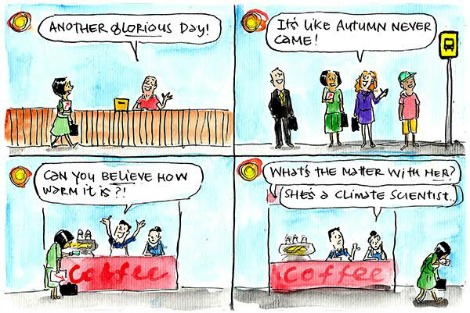
CARTOON
- Fiona Katauskas
- 18 May 2016
1 Comment
This week's offering from Eureka Street's award winning political cartoonist.
READ MORE 
-
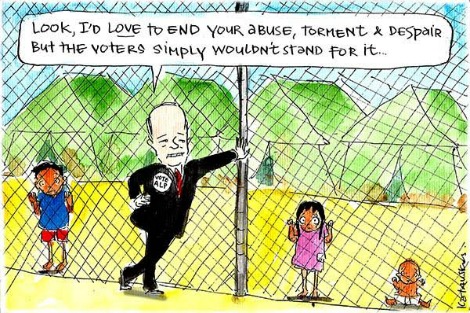
CARTOON
- Fiona Katauskas
- 11 May 2016
8 Comments
This week's offering from Eureka Street's award winning political cartoonist.
READ MORE 
-
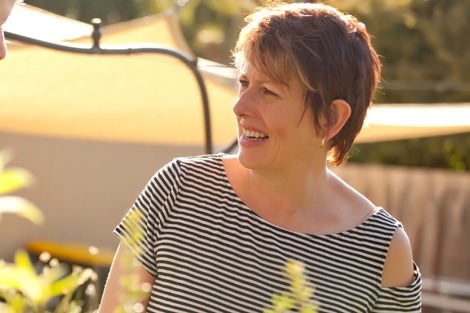
AUSTRALIA
'We have now got a world wide refugee problem. We don't have one here but we do have one world wide. It is now time to start having a rational debate about what we do with these people as opposed to playing the race card.' Interview with Anna Burke, who has represented the seat of Chisholm in the House of Representatives for the ALP since 1998. Burke is the former Speaker of the House (2012–2013), and has been a consistent advocate for asylum seekers. She will retire at the next election.
READ MORE 
-
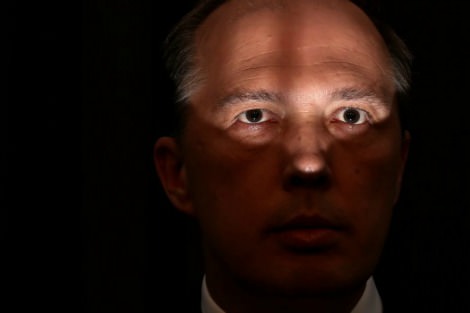
AUSTRALIA
I talk to those on Manus at all times of the day and night and make sure they are okay. Of course, they are not okay, but so far all of my friends are still alive We keep their spirits up by sending them clothes, games and keeping their phones paid-for so they can talk to their families. We keep them informed about what is going on in Australia. We do not encourage them to hurt themselves in order to put pressure on the government. We do everything possible to stop them from hurting themselves.
READ MORE 
-
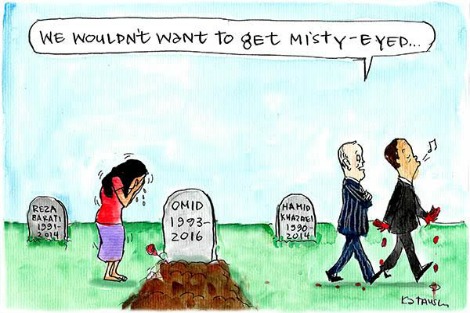
CARTOON
- Fiona Katauskas
- 04 May 2016
1 Comment
This week's offering from Eureka Street's award winning political cartoonist.
READ MORE 
-
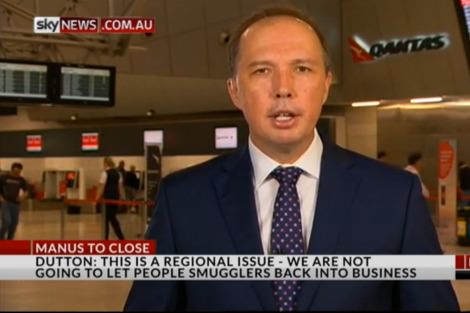
AUSTRALIA
- Kate Galloway
- 02 May 2016
23 Comments
I have often wondered at the likely success of entreaties to compassion for asylum seekers. This is not because I do not personally feel compassion for these people. And it is not because I do not believe that it is morally correct to show compassion, including through government policy. Rather my response is partly a factor of my training as a lawyer. Through my legal eyes, I can see little hope for appeals to politicians to show compassion. My conditioned response instead is to appeal to law.
READ MORE 
-
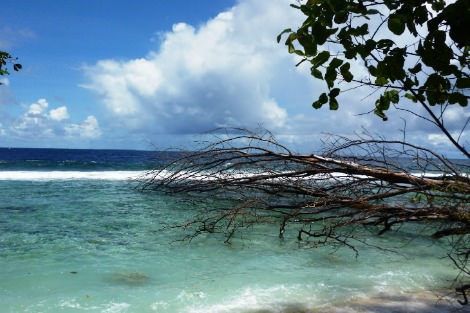
INTERNATIONAL
- Kerry Murphy
- 29 April 2016
9 Comments
This week we learnt that the human rights protection for asylum seekers in our former colony Papua New Guinea are more protected by the PNG constitution than they would be in Australia. The PNG government has quickly moved not to change the law and constitution, but to make arrangements to close the centre and ask Australia to take back the asylum seekers. Already PNG lawyers are talking about claims for compensation for the unlawful detention, and rightly so.
READ MORE 
-
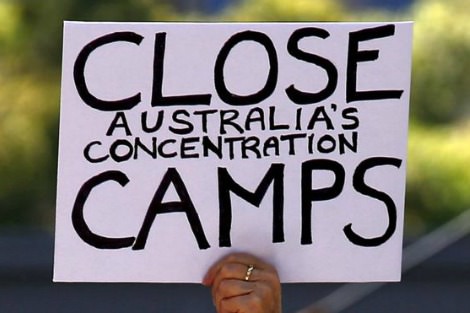
INTERNATIONAL
- Frank Brennan
- 28 April 2016
33 Comments
A bench of five justices of the Supreme Court of Justice, the highest court in Papua New Guinea, has unanimously ruled that the detention of asylum seekers on Manus Island is unconstitutional. Yet again, Australia has been complicit in its Pacific neighbours (PNG and Nauru) prostituting their Constitutions and undermining the rule of law in exchange for a fistful of dollars, with hapless asylum seekers, most of whom are ultimately proved to be refugees, being left to languish.
READ MORE 
-
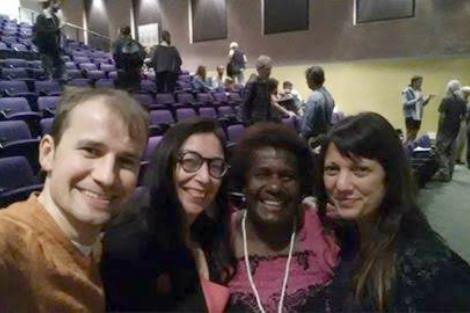
ENVIRONMENT
Ursula Rakova told how the sea that had been the friend of her people, was turning against them. It had crashed through and divided her island in two. Coconut palms were collapsing at the new shoreline. Food gardens were lost, as the soil was increasingly rendered infertile by salty tides that washed over them. The land that had been handed from grandmother to daughter, would bequeath no legacy to the granddaughters. The homeland of generations was disappearing before their eyes.
READ MORE 
-
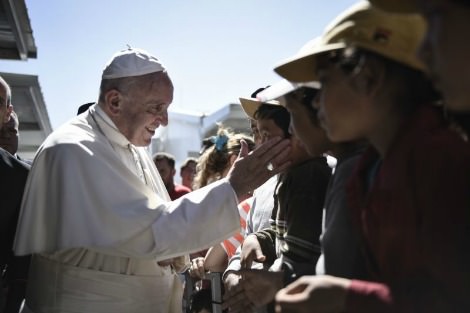
RELIGION
- Andrew Hamilton
- 19 April 2016
15 Comments
Lesbos is famous for crossing boundaries. It was the home of the poet Sappho and the tender, delicate lyrics dedicated to the woman who was her lover. More recently it has been the home of refugees who have crossed from the murderous conflict in Asia. Pope Francis is also as famous for crossing boundaries as we Australians are for patrolling them. He is reinventing the papacy as a one-man barbed-wire-cutting team. So it is not surprising he decided at short notice to cross into Lesbos.
READ MORE 
-

AUSTRALIA
The chants were thunderous and sustained, as the suited and elegantly coiffed guests began to arrive for the Liberal Party fundraiser at Docklands. Initially there did not seem to be a significant police presence, as if the need for security was not considered high. As the chanting rose to a crescendo, chaos ensued. The mounted police arrived; but there seemed no plan of crowd control. It was a small protest but it was locked into a contained area with only one entrance. Then the wounded started to emerge.
READ MORE 
-
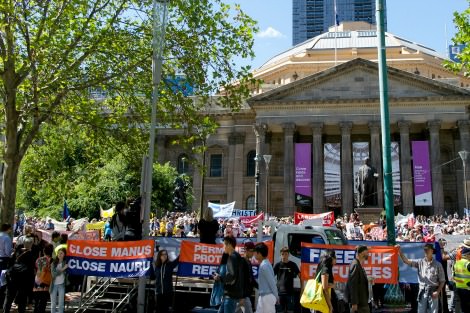
AUSTRALIA
- Andrew Hamilton
- 31 March 2016
5 Comments
The Palm Sunday Refugee Marches have come and gone; the travails of people who seek asylum continue. In a recent article that reflects her rich experience, Moira Rayner was right to say that marches are not effective in changing policy. Where they are, as in the Vietnam War marches in Australia or in Manila under Marcos, the fortress was already crumbling. Yet even when they are not effective, marches are not a waste of energy. Their value lies not in their effectiveness but in their ritual.
READ MORE 